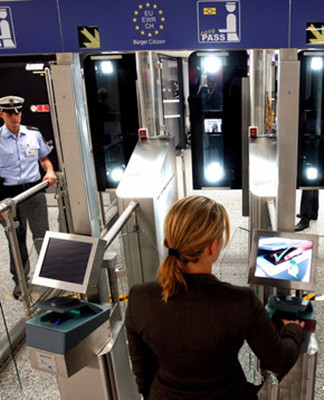歐洲移民
The great escape
勝利大逃亡
Emigration may not relieve pressure on wages in weak economies
在經濟疲軟的背景下,歐洲人移民國外也許不能在工資方面緩解壓力
Purchasing power on the move
購買力在移動
TO ECONOMISTS, an “optimal currency area” is one in which the gains from sharing a single currency outweigh the costs. There is some debate as to whether the euro area qualifies.
對于經濟學家來說,一個“最優貨幣區”意味著共用同一種貨幣的收益要大于成本。歐元區是否符合“最優貨幣區”的條件,存在一些爭議。

Among the keys to making shared currencies work, according to Robert Mundell, the godfather of optimal-currency theory, is a mobile workforce. Countries tying the monetary knot give up the right to slash interest rates or devalue when stormclouds gather. A slump focused on just one region of the currency zone can therefore last a long time: until falling wages make hiring there attractive once more. But if the jobless can up sticks for sunnier shores, this discomfort can be curbed.
根據最優貨幣理論的鼻祖,羅伯特.蒙代爾的理論,流動的勞動力是從統一貨幣的政策中獲利的關鍵。當不利的經濟信號顯現時,參與實施統一貨幣政策的眾多國家將放棄削減利率或干預貨幣貶值的權力。在統一貨幣區內,經濟衰退集中在一個地區,因此,這種經濟衰退會持續很長一段時間,直到這個地區的工資下降,使得招聘啟事再次具有吸引力。但是如果失業者可以遷居到經濟狀況較好的地區,這種經濟衰退就可以得到抑制。
In the 1990s a few prescient critics noted that “fluidity” was not a characteristic commonly used to describe European labour markets. Just 0.35% of Europeans migrate across borders each year, compared with the nearly 2.5% of Americans leaving one state for another. The crisis boosted euro-area migration rates, but overall numbers remain small.
20世紀90年代,幾位有先見之明的評論家指出,“流動性”指標不常用來說明歐洲勞動力市場特征。每年跨國遷移的歐洲人僅有0.35%,而有近2.5%的美國人跨州遷移,兩者相比,前者遷移人數很少。經濟危機提升了歐元區的人口遷移比率,但總體遷移人數并不多。
Immobility might not always be quite the drag academics fear, however. New research by Emmanuel Farhi of Harvard University and Iván Werning of MIT finds that although migrants out of depressed regions get the expected boost from relocation, those left behind may or may not benefit, depending on the nature of the slump.
然而,人口流動停滯也許并不總是那么讓學者們擔心。在一項新開展的研究中,哈佛大學的Emmanuel Farhi和麻省理工的Iván Werning發現,盡管人們從經濟蕭條地區遷移出去可以按照預期推動遷居地的經濟發展,但原住地是否能從中獲益,這取決于經濟衰退的性質。
The problem, they note, is that departing migrants take their purchasing power with them when they go. If a region's troubles are the result of tumbling exports that is no big deal. Exporting surplus labour spares the struggling economy the need to suffer falling wages.
他們指出,問題是,移民者的離去使得原住地失去了這部分人群的購買力。如果一個地區的困擾是出口嚴重下滑的結果,這沒什么大不了的。出口剩余的勞動力使得疲弱的經濟不必再遭受工資下降的打擊。
If instead the struggling region is facing weak domestic demand then shipping excess labour abroad does not help, because the loss of migrants' spending further weakens demand. Instead, higher exports are needed to make up for insufficient domestic spending. That requires improved competitiveness—which often means lower wages.
如果情況相反,經濟疲弱地區正面臨的是內需不足,再向國外輸出過剩勞動力就無益了,因為若失去這部分移民者的購買力,則會進一步削弱內需。取而代之的解決方案應該是,需要更高的出口來彌補國內消費不足。這就需要提高競爭力,而提高競爭力通常意味著低工資。
Interestingly, however much their lot improves when they move, migrants tend to judge their fortunes relative to economic conditions at home. According to a new working paper from the Institute for the Study of Labour, a German think-tank, migrants to Germanybecome glummer the better the economy in their country of origin does. But they cheer up considerably when unemployment rises at home, presumably because that confirms the wisdom of having moved. By then, they have perhaps been in Germanylong enough to learn the word Schadenfreude.
有趣的是,遷移過程中,無論移民者的生活怎樣改善,他們都傾向于依據家鄉的經濟狀況來評判自己的財富狀況。根據一個德國智囊團,勞動力研究所的一份新的工作報告,遷入德國的移民變得愈加愁苦,他們本國的經濟就變得愈好。但是當發現本國失業率上升,他們就明顯振作起來,大概是因為這證明了自己當初移民是明智的抉擇。到那時,他們也許已經在德國居住了很久,以至于都學會了“幸災樂禍”這類德語單詞。












